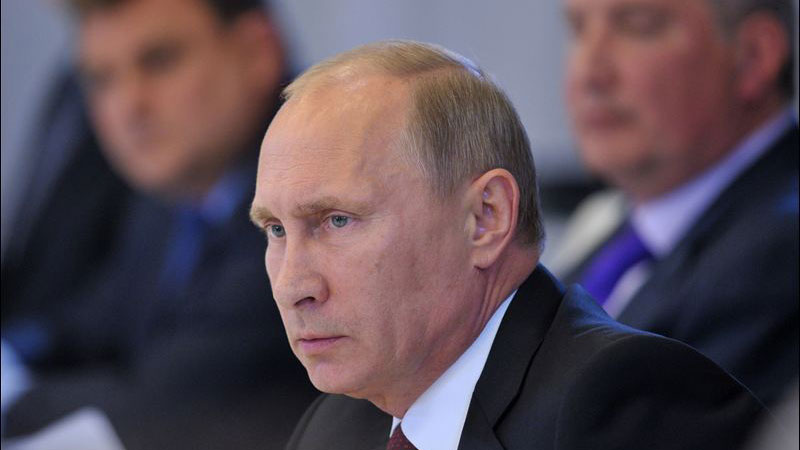Testing Putin in Syria

There has been no shortage of scrutiny of what Russian President Vladimir Putin is up to in Syria and why. Much of the analysis, though, has been narrowly focused on the short term and may be too negative in assessing his actions’ likely long-term consequences.
What we know is that Putin has decided to come to the aid of Bashar al-Assad’s embattled regime. Russian bombs and missiles are now raining down on an array of armed groups that have been fighting Syrian government forces, which has given the regime the breathing space that Russia’s intervention was intended to provide.
As bad as the Assad government is, and as much as it has to answer for, this outcome is arguably preferable in the short run to the regime’s collapse. The painful truth in Syria today is that a government implosion would most likely lead to genocide, millions more displaced people, and the establishment of the Islamic State’s so-called caliphate in Damascus.
Putin’s motives are a matter of speculation, but it would appear that he did not want to see Russia’s long-term ally in the Middle East fall. Moreover, he never misses an opportunity to remind the world that Russia remains a major power, able and willing to act on behalf of its perceived interests. It is also possible that he sought to distract domestic attention from a shrinking economy and the rising cost of intervention in Ukraine. Putin’s high approval ratings suggest he may well be succeeding.
Many fear that Russia’s latest activism will not only prolong Syria’s brutal civil war, but also strengthen the Islamic State. This could well turn out to be the case, as hatred of the Assad regime is a major recruiting tool. And, thus far at least, the Islamic State seems to be a low priority for the Russian military, which appears to be attacking mainly other anti-Assad groups.
Indeed, there have been reports of the Islamic State moving into areas that others have abandoned following Russian attacks. Russia seems to be playing the same cynical game as Assad: framing the war as a binary choice between the Islamic State and a regime that, however flawed, still deserves the world’s support.
Some also fear that this demonstration of Russian assertiveness presages a new wave of such interventions, even a new Cold War. But this is unlikely, if for no other reason than that Russia lacks the economic and military means to sustain such efforts on multiple fronts. It is also not clear that the Russian people are prepared to pay a high price for such a foreign policy.
So it all comes down to Putin, who enjoys a degree of autonomy in Kremlin decision-making not seen since the Stalin era. Putin is widely known to be a martial-arts enthusiast, and his action in Syria is entirely consistent with many of the discipline’s principles, including the importance of the decisive thrust that neutralizes the opponent’s strengths and exploits his weaknesses.
But force has its limits. Russia’s intervention in Syria cannot succeed if success is defined as enabling the Assad government to regain control over the bulk of the country’s territory. Putin’s policy can, at most, establish a relatively secure enclave.
Even this modest aim will prove costly, because the Islamic State is also becoming stronger. And it could prove expensive to Russia itself: it is only a matter of time before suicide bombings (such as the recent attack in Ankara) occur in Moscow.
The real question, then, is whether Putin sees bolstering the Assad government as an end in itself or as a means to an end. If it is the latter – if Putin is thinking in terms of chess, the preferred game of many Russians, and planning several moves ahead – a diplomatic process, in which Assad is removed at some point, is conceivable. Russia might support such a process; after all, Putin is not known for his sentimentality. Indeed, he might embrace a political process that enabled him to demonstrate Russia’s central role in shaping the future of the Middle East.
In the meantime, the United States and others should pursue a two-track policy. One track would channel steps to improve the balance of power on the ground in Syria. This means doing more to help the Kurds and select Sunni tribes, as well as continuing to attack the Islamic State from the air.
Relatively safe enclaves should emerge from this effort. A Syria of enclaves or cantons may be the best possible outcome for now and the foreseeable future. Neither the US nor anyone else has a vital national interest in restoring a Syrian government that controls all of the country’s territory; what is essential is to roll back the Islamic State and similar groups.
The second track is a political process in which the US and other governments remain open to Russian (and even Iranian) participation. The goal would be to ease Assad out of power and establish a successor government that, at a minimum, enjoyed the support of his Alawite base and, ideally, some Sunnis.
Such a process might well confer prestige on Putin. That would be a price worth paying if it contributed to a dynamic that over time reduced both the suffering of the Syrian people and the danger posed by the Islamic State.
Source: Project-Syndicate

